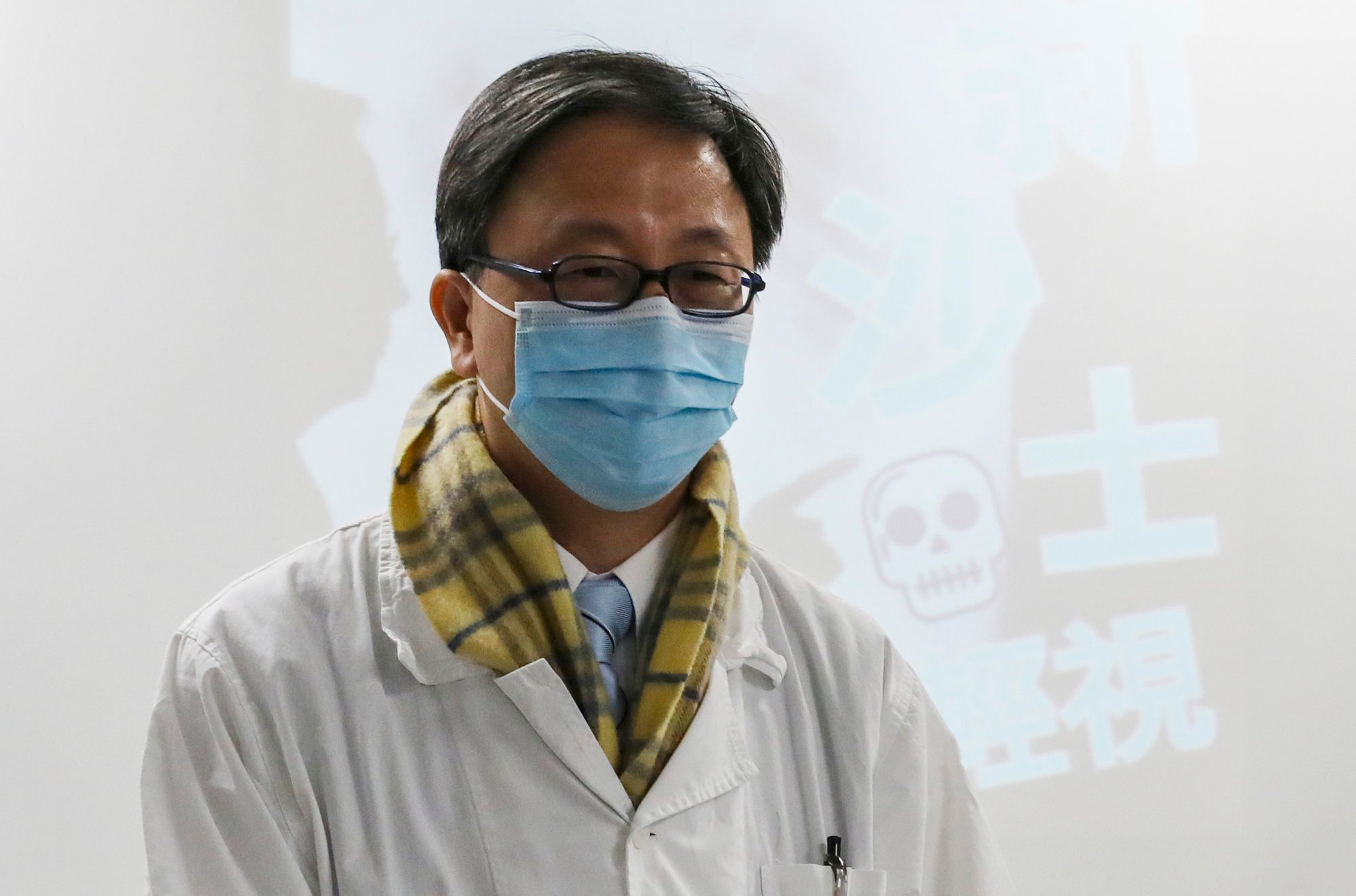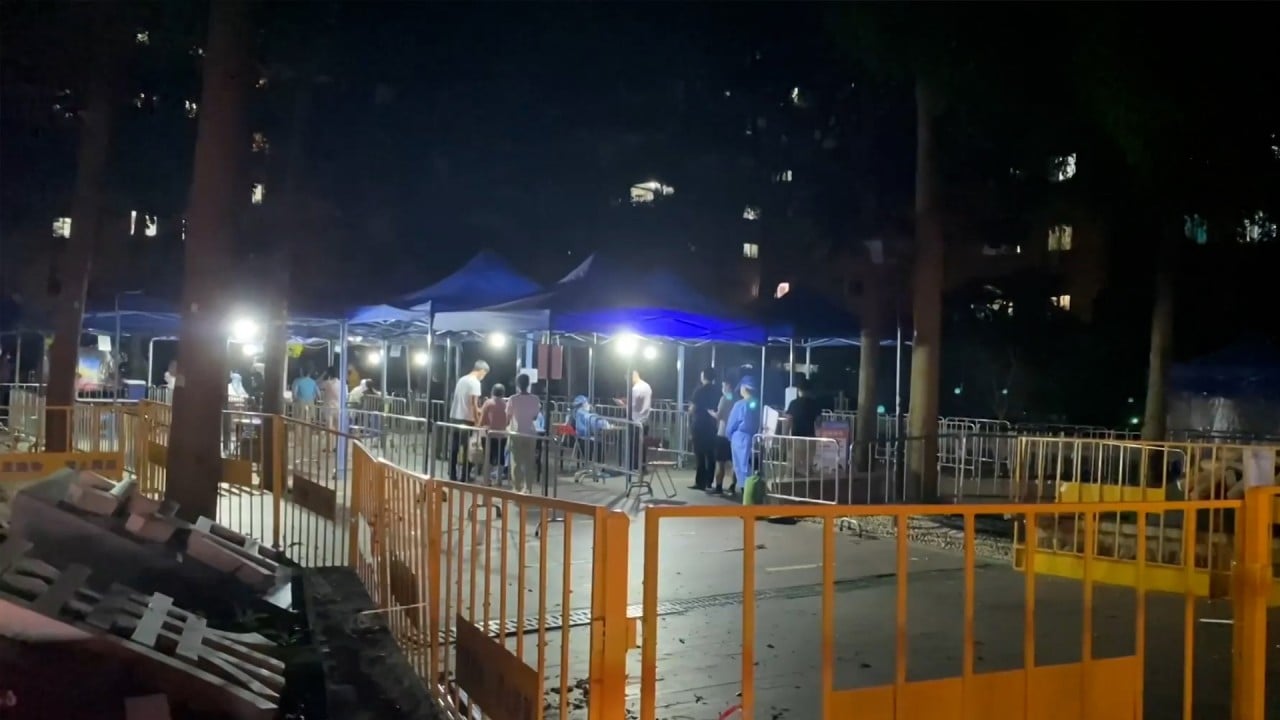
Coronavirus: former leader CY Leung says Beijing understands Hong Kong’s need to reopen border, suggests quota of up to 50,000 visitors
- Former Hong Kong leader Leung Chun-ying says city should negotiate with Beijing to allow 40,000 to 50,000 travellers to cross border daily
- Officials confirm 2,004 cases on Wednesday, the most since 2,535 were recorded on April 9
Beijing understands Hong Kong’s urgent need to reconnect with mainland China and the city should seek permission for as many as 50,000 travellers to cross the border daily, an advisor has told the Post.
In an exclusive interview with the Post on Tuesday, Leung also urged Hong Kong to start considering how many spots should be allocated to different categories of travellers entering the mainland under a shorter quarantine period or an exemption from such measures.
“The central government will listen to the views [of Hong Kong people]. But apart from asking for reopening the border, should we also take a step further to think about how to allocate the quota if the reopening is carried out on a smaller scale under a more relaxed quarantine requirement?” Leung said.
“How many [places] should be allocated to those who need to visit their old family members with illnesses? How many for those working and studying on the mainland? How many for people who need to do business? We need to discuss and inform the central government.”
Hong Kong ‘may cut hotel quarantine to 5 days, with 2 more in home isolation’
The mainland on Tuesday announced the biggest change to its entry rules since it closed its borders in March 2020, cutting quarantine time for overseas arrivals from 10 days to seven days at a government-run facility. Arrivals will also undergo three days of home isolation instead of the previous seven days.
On the same day, Hong Kong’s incoming health minister said the city could potentially reduce the hotel quarantine period for travellers from seven to five days, with another two days in home isolation.
Leung said it would require a huge amount of administrative resources from both local and central governments to return to the pre-pandemic figure of 400,000 to 500,000 travellers crossing the border every day, as arrivals would be required to get tested and show proof of vaccination.
But the former leader said Hong Kong could consider a smaller range of 40,000 to 50,000 visitors per day.
As of Tuesday, more than 969,000 people have registered as part of the local health code system, which facilitates quarantine-free travel between Guangdong, Macau and Hong Kong.
“I believe the central government fully understands the appeals and wishes of the Hong Kong people, which have already been fully reflected by the business sector, members of both the National People’s Congress and the National Committee of the Chinese People’s Political Consultative Conference,” Leung said.
He added that the mainland’s stringent border controls not only applied to Hong Kong but also to mainland provinces and cities.
“The central government gives high priority to the health of its people. This is also a consideration,” he said.
Dr Lam Ching-choi, a member of the Executive Council, the city leader’s de facto cabinet, said the daily quota could depend on the quarantine capacity of Guangdong province, noting there was high demand for isolation spaces among overseas arrivals too.
“The cutting of the quarantine period to seven days at a government-run facility and three days at home has helped move the Covid policies between the two sides closer together, and therefore made it easier for an eventual deal to reopen the mainland border,” Lam added.
Lawmaker Chan Han-pan of the Democratic Alliance for the Betterment and Progress of Hong Kong (DAB) said his recent proposal to use some of the 10,000 places at makeshift isolation facilities for residents planning to visit the mainland could bridge the quarantine capacity gap.
“Of course, there will still be worries on the mainland’s part about importing infections from Hong Kong. After all, the city is still reporting about 2,000 cases a day,” he said.

Stopping short of providing any breakdown of the quota based on the different types of visitors, Chan said that considerations should be made for those travelling for family or business purposes.
But government pandemic adviser Professor David Hui Shu-cheong said Hong Kong needed to first decide whether to reconnect with the rest of the world, noting that recent calls to reduce the current seven-day hotel quarantine period could threaten talks to reopen the border with the mainland.
On Wednesday, health officials confirmed 2,004 infections, including 155 imported cases. The figure was up from 1,685 infections the day before and 1,873 on Monday. No new deaths were reported.
The last time the city recorded more than 2,000 infections was on April 9, with 2,535 cases. The overall coronavirus tally in the city stands at 1,243,185 cases, with 9,399 related fatalities.
“This shows there are some transmission chains in the community. It could be due to the relaxation of social-distancing measures in late May,” said Dr Albert Au Ka-wing from the Centre for Health Protection. “While things are getting back to normal, there are more social activities and restaurants opening longer, and this would give rise to more cases in the community.”
Hong Kong may get BioNTech’s Omicron-targeted vaccine; 1,685 cases logged
Authorities also recorded 15 more patients who tested positive for the Omicron subvariants BA.4 and BA.5, including four untraceable cases. Au described the increase in infections unrelated to imported cases of the two strains as “concerning”.
Dr Michael Wong Lap-gate, chief manager at the Hospital Authority, estimated that more than 2,000 hospital beds would be in use when the current outbreak peaked in July, based on predictions from the University of Hong Kong.
Wong said over 500 beds could be mobilised immediately for coronavirus patients, while 2,000 more could be set to be ready within 48 hours. Some 5,000 and 11,500 beds could also be put into service within one and two weeks respectively if needed, he added.
He also said each hospital cluster could dispatch several hundred staff to North Lantau Hospital, Hong Kong Infection Control Centre and AsiaWorld-Expo’s treatment facility if needed, with a roster already set up to ensure personnel could be mobilised immediately.
China eases quarantine for overseas arrivals based on ‘lessons learned’
Hospital Authority Chief Manager Dr Lau Ka-hin said such preparations could address any uncertainties such as new subvariants or any drop in the population’s level of protection against the coronavirus.
“If we are quite far apart from the last wave, the immune level may drop after a while and the number of infections may increase. That’s why we want to make sure more beds are available in the short term,” he said.
Lau added that the authority might consider suspending certain non-urgent services if there was more need to receive more patients, but said he believed they were able to cope with the higher demand.
Earlier, Allen Shi Lop-tak, president of the Chinese Manufacturers’ Association of Hong Kong, said he expected more Hongkongers to travel to the mainland as a result of Beijing’s announcement that it would ease isolation rules for overseas arrivals.
Shi called for an increase in the daily quota of the “Return2HK” scheme, under which locals were exempt from quarantine, from 3,000 to 5,000 for those returning via Shenzhen Bay Port.
“It has been hard for people to travel to mainland China due to the 21-day quarantine period,” Shi, who represents 3,000 companies, told a radio programme. “Many people will want to go after the quarantine time was cut by half, especially during the summer holiday due to family reasons.”
Under the “Return2HK” scheme, Hongkongers coming back from the mainland who have tested negative for Covid-19 at least 72 hours before arrival are exempted from going through quarantine in the city. The daily quota for those using Shenzhen Bay Port is 3,000, and for the Hong Kong-Zhuhai-Macau Bridge 2,000.
“There may be a bottleneck in the daily quota in the future, as many businesspeople and residents will use the ‘Return2HK’ scheme to save time in quarantine,” Shi said.
Essential workers in Hong Kong still not paid Covid-19 emergency support cash
Shi added that the quarantine hotel quota for Shenzhen Bay Port should be increased from 800 to 3,000 as supply was tight, otherwise locals would find it hard to go north.
While some local politicians had suggested letting Hongkongers undergo isolation in a local facility before crossing the border, Shi did not give a view but said it would be up to Beijing to decide.
He said the Hong Kong government could consider further shortening the quarantine period to three days if no large rebound in infections occurred.
Infectious diseases specialist Dr Ho Pak-leung suggested cutting the hotel isolation period for arrivals to three days, with four days of medical surveillance at home. Travel from home to office should be allowed, but premises such as restaurants, pubs, beauty parlours and gyms should be off-limits, he proposed.

Lawmaker Michael Tien Puk-sun criticised the suggestion of a five-day quarantine period and two days of self-isolation, calling it undesirable. The legislator instead called for people to undergo three days in quarantine and four in a “closed-loop” arrangement, with participants restricted to commuting between home and work for the latter period.
“If the State Council eased the quarantine requirements amid the nationwide zero-Covid policy, why can’t Hong Kong do it?” he said, referring to China’s highest governing body.
Separately, three of Hong Kong’s care homes for the elderly and disabled have reported infections, while 186 schools also confirmed 217 new cases.
Additional reporting by Nadia Lam and Denise Tsang



